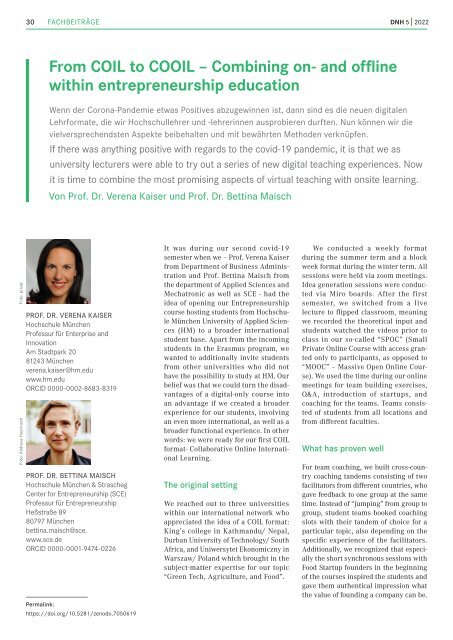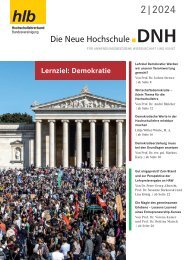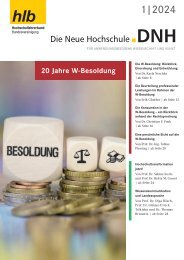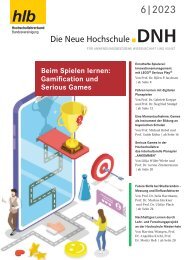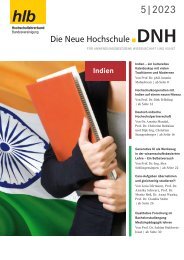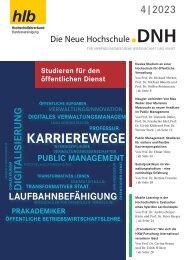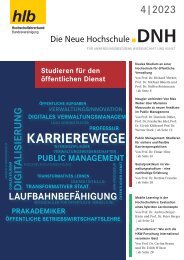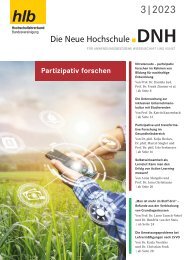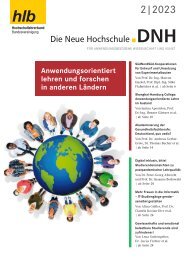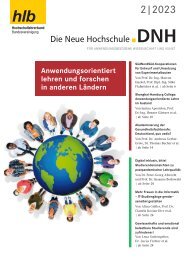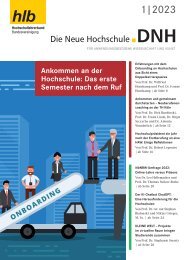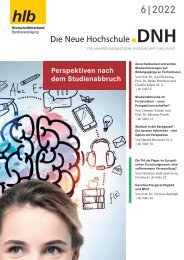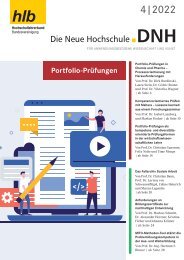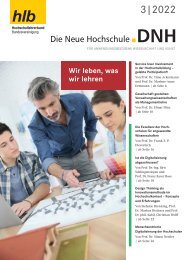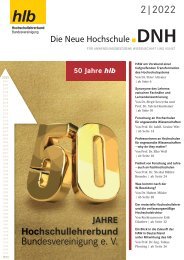Die Neue Hochschule Heft 5/2022
Zeitschrift des hlb Hochschullehrerbund e.V. - Themenschwerpunkt: Gesundheitsberufe an HAW studieren
Zeitschrift des hlb Hochschullehrerbund e.V. - Themenschwerpunkt: Gesundheitsberufe an HAW studieren
Sie wollen auch ein ePaper? Erhöhen Sie die Reichweite Ihrer Titel.
YUMPU macht aus Druck-PDFs automatisch weboptimierte ePaper, die Google liebt.
30 FACHBEITRÄGE DNH 5 | <strong>2022</strong><br />
From COIL to COOIL – Combining on- and offline<br />
within entrepreneurship education<br />
Wenn der Corona-Pandemie etwas Positives abzugewinnen ist, dann sind es die neuen digitalen<br />
Lehrformate, die wir Hochschullehrer und -lehrerinnen ausprobieren durften. Nun können wir die<br />
vielversprechendsten Aspekte beibehalten und mit bewährten Methoden verknüpfen.<br />
If there was anything positive with regards to the covid-19 pandemic, it is that we as<br />
university lecturers were able to try out a series of new digital teaching experiences. Now<br />
it is time to combine the most promising aspects of virtual teaching with onsite learning.<br />
Von Prof. Dr. Verena Kaiser und Prof. Dr. Bettina Maisch<br />
Foto: privat<br />
Foto: Andreas Hoernisch<br />
PROF. DR. VERENA KAISER<br />
<strong>Hochschule</strong> München<br />
Professur für Enterprise and<br />
Innovation<br />
Am Stadtpark 20<br />
81243 München<br />
verena.kaiser@hm.edu<br />
www.hm.edu<br />
ORCID 0000-0002-8683-8319<br />
PROF. DR. BETTINA MAISCH<br />
<strong>Hochschule</strong> München & Strascheg<br />
Center for Entrepreneurship (SCE)<br />
Professur für Entrepreneurship<br />
Heßstraße 89<br />
80797 München<br />
bettina.maisch@sce.<br />
www.sce.de<br />
ORCID 0000-0001-9474-0226<br />
Permalink:<br />
https://doi.org/10.5281/zenodo.7050619<br />
It was during our second covid-19<br />
semester when we – Prof. Verena Kaiser<br />
from Department of Business Administration<br />
and Prof. Bettina Maisch from<br />
the department of Applied Sciences and<br />
Mechatronic as well as SCE - had the<br />
idea of opening our Entrepreneurship<br />
course hosting students from <strong>Hochschule</strong><br />
München University of Applied Sciences<br />
(HM) to a broader international<br />
student base. Apart from the incoming<br />
students in the Erasmus program, we<br />
wanted to additionally invite students<br />
from other universities who did not<br />
have the possibility to study at HM. Our<br />
belief was that we could turn the disadvantages<br />
of a digital-only course into<br />
an advantage if we created a broader<br />
experience for our students, involving<br />
an even more international, as well as a<br />
broader functional experience. In other<br />
words: we were ready for our first COIL<br />
format- Collaborative Online International<br />
Learning.<br />
The original setting<br />
We reached out to three universities<br />
within our international network who<br />
appreciated the idea of a COIL format:<br />
King’s college in Kathmandu/ Nepal,<br />
Durban University of Technology/ South<br />
Africa, and Uniwersytet Ekonomiczny in<br />
Warszaw/ Poland which brought in the<br />
subject-matter expertise for our topic<br />
“Green Tech, Agriculture, and Food”.<br />
We conducted a weekly format<br />
during the summer term and a block<br />
week format during the winter term. All<br />
sessions were held via zoom meetings.<br />
Idea generation sessions were conducted<br />
via Miro boards. After the first<br />
semester, we switched from a live<br />
lecture to flipped classroom, meaning<br />
we recorded the theoretical input and<br />
students watched the videos prior to<br />
class in our so-called “SPOC” (Small<br />
Private Online Course with access granted<br />
only to participants, as opposed to<br />
“MOOC” – Massive Open Online Course).<br />
We used the time during our online<br />
meetings for team building exercises,<br />
Q&A, introduction of startups, and<br />
coaching for the teams. Teams consisted<br />
of students from all locations and<br />
from different faculties.<br />
What has proven well<br />
For team coaching, we built cross-country<br />
coaching tandems consisting of two<br />
facilitators from different countries, who<br />
gave feedback to one group at the same<br />
time. Instead of “jumping” from group to<br />
group, student teams booked coaching<br />
slots with their tandem of choice for a<br />
particular topic, also depending on the<br />
specific experience of the facilitators.<br />
Additionally, we recognized that especially<br />
the short synchronous sessions with<br />
Food Startup founders in the beginning<br />
of the courses inspired the students and<br />
gave them authentical impression what<br />
the value of founding a company can be.


